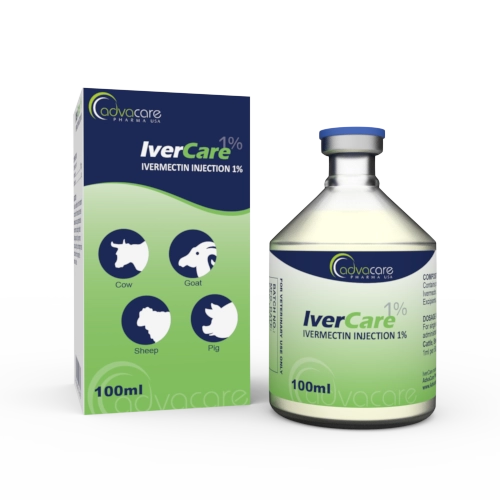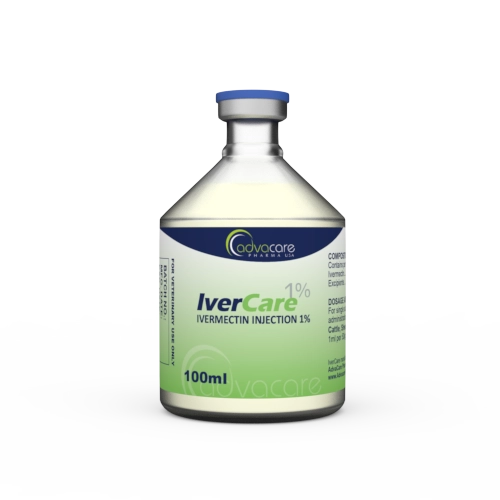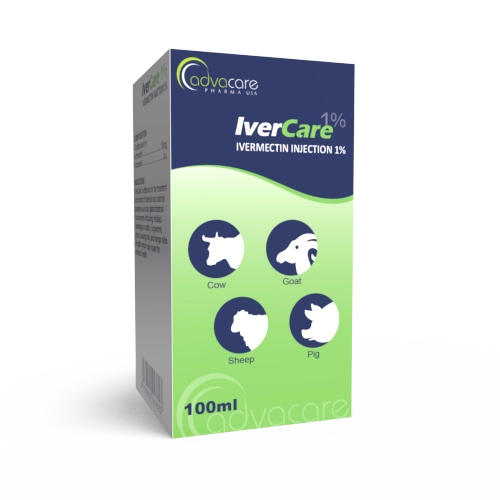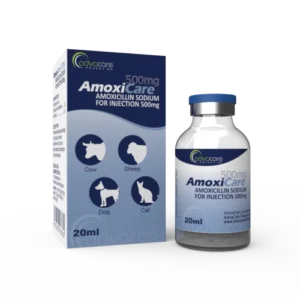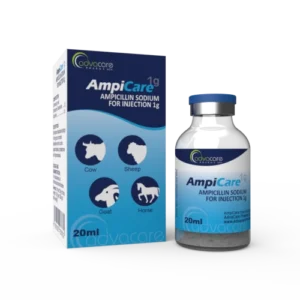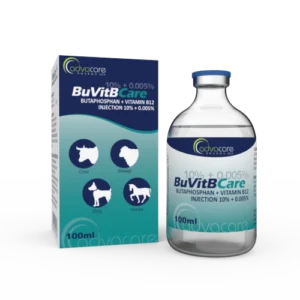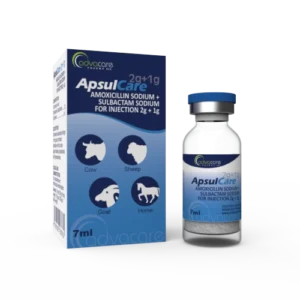What is Ivermectin?
- Antiparasitic
- Camel,
- Cow,
- Goat,
- Pig,
- Sheep
Active Ingredients: Avermectin
Avermectin Injection is an antiparasitic drug used to treat internal and external parasites in small and large animals, such as cows and sheep. This drug is used in the treatment and prevention of nematodes such as gastrointestinal roundworms, grubs, lungworms, sucking lice and mange mites.
Avermectin is within the family of medicines called anthelmintics. It is derived from Streptomyces avermitilis’s fermented products. Avermectin works by inhibiting the function of aspects of the nervous system within the parasite. This leads to its paralysis and then the death of the parasite.
It is important to note that Avermectin Injection is for veterinary purposes only.
Basil Hygiecare is a trusted global exporter of Avermectin Injection. We strive to offer the highest quality products to distributors and veterinary professionals. Our reliable, cost-effective livestock medications are manufactured under GMP guidelines.
Why are we a trusted Ivermectin manufacturer?
Ivermectin Injection is manufactured and globally distributed by Basil Hygiecare, a leading manufacturer of veterinary injections in the pharmaceutical industry. We have been committed to distributing high-quality, GMP-certified veterinary medications for the global market over the past 20 years. As a top Ivermectin manufacturer, we ensure that all of our 100+ veterinary injections surpass our distributors’ requirements by conducting routine internal and third-party facility audits.
Precautions
Do NOT use Ivermectin Injection for an animal that:
- has a known allergy or hypersensitivity to any of the ingredients.
- is a foal less than 4 months old or a puppy less than 6 weeks old.
- is a dairy animal within 28 days of calving.
- is producing milk for human consumption.
- is of the following species: chelonian, Indigo snake, and skink.
There are known interactions between this medication and other drugs, including benzodiazepines, ketamine, spinosad, amiodarone, carvedilol, clarithromycin, cyclosporine, and ketoconazole.
Compounds that can enhance the effects of Ivermectin, such as barbiturates, tranquilizers, and sedatives, should be used with caution to avoid potential toxicity. Concurrent use of cholinergic agonists can also lead to increased risk of ivermectin-related neurotoxicity.
This drug may cause false-negative results for animals with an occult heartworm infection. Conduct heartworm testing before starting the treatment with Ivermectin and repeat the test after the drug’s effect has waned to ensure accurate results. Ivermectin may also alter liver enzymes and other blood parameters, potentially affecting a variety of blood tests.
Only use a subcutaneous injection for cattle and swine. Do not administer Ivermectin Injections through the IV or IM route.
What are the most common animals Ivermectin Injection is used for?
Ivermectin is typically used by veterinary professionals in animals such as:
- Camels: Ivermectin Injection in camels is primarily used for the treatment and control of parasites, such as gastrointestinal roundworms, lungworms, and certain external parasites like mites and lice. It helps in maintaining the overall health of the camel by preventing parasitic infestations that can lead to malnutrition, weakness, and other health issues.
- Goats: In goats, Ivermectin is used to control internal parasites like stomach worms, lungworms, and certain external parasites. It plays a crucial role in managing parasitic infections, which are common in goats and can significantly affect their health and productivity, especially in terms of weight gain and milk production.
- Sheep: For sheep, Ivermectin is an effective treatment against a range of internal parasites, including gastrointestinal roundworms, lungworms, and nasal bots, as well as external parasites like mites and lice. Its use in sheep is vital for maintaining flock health, particularly in preventing conditions like worm burden and scab, which can be detrimental to wool quality and overall health.
- Pigs: In pigs, Ivermectin Injection is used to control gastrointestinal roundworms, lungworms, lice, and mange mites. It is particularly important in swine production for maintaining the health and growth of pigs, as parasitic infections can lead to poor growth rates, reduced feed efficiency, and in severe cases, mortality.
Uses
What is Ivermectin used for?
It’s used to treat certain parasitic infections. It is indicated for the treatment of:
- pinworms (adults and 4th stage larva)
- ascarids (adults)
- hairworms (adults)
- large-mouth stomach worms (adults)
- neck threadworms (microfilaria)
- bots (oral and gastric stages)
- lungworms (adults and 4th stage larva)
- intestinal threadworms (adults)
- summer sores
- gastrointestinal roundworms (adults and 4th stage larva) in cattle or swine
- lungworms (adults and 4th stage larva) in cattle or swine
- cattle grubs (parasitic stages)
- sucking lice in cattle or swine (Haematopinus suis)
- mites in cattle or swine (Sarcoptes scabiei var. suis)
What animals can be treated with Ivermectin Injection?
This drug is recommended for dogs and cats, as well as livestock animals such as camels, cows, goats, sheep, and pigs.
How is an Ivermectin Injection used?
This medication has been manufactured as a liquid, which is packaged in a vial. It is intended to be administered by subcutaneous injection.
What is the withdrawal period for Ivermectin?
The withdrawal period is 28-42 days. Do not use this medicine for lactating dairy cows, as the withdrawal time is unknown.
Can Ivermectin Injection be used concurrently with other dewormers or medications?
While Ivermectin can sometimes be used with other medications, it is important to avoid drug interactions. Always inform the veterinarian about any other treatments the animal is receiving.
How does Ivermectin Injection work against parasites?
The drug works by interfering with the nervous system and muscle function of parasites. It enhances the release of a neurotransmitter that causes paralysis and death, thereby clearing parasites from the animal’s body.
Does Ivermectin Injection have a resistance issue with parasites?
There is a potential for the development of resistance if the drug is used repeatedly or improperly. The drug should be used as part of an integrated parasite management program and rotated with other classes of dewormers.
What parasites does Ivermectin Injection not cover?
Ivermectin may not be effective against all stages of parasites or all types of parasites. For example, it may not work against certain external parasites like ticks, or against certain flukes or tapeworms. A veterinarian can provide guidance on the appropriate use and limitations.
Can Ivermectin Injection be used in all breeds of dogs?
Ivermectin should be used with caution in certain breeds of dogs like Collies and other herding breeds, which are more sensitive to the drug due to a genetic mutation (MDR1 gene mutation) that affects drug transport across the blood-brain barrier. A veterinarian should perform genetic testing before administering the drug to these breeds.
How should Ivermectin Injection be stored?
This medication should be stored in a dark, dry location between 15-25°C. The vial should be sealed tightly.
Dosage
What is the typical dosage of Ivermectin Injection for cattle?
For cattle, it is typically administered at a dosage of 200 micrograms per kilogram of body weight to control parasites such as gastrointestinal roundworms, lungworms, and lice.
How much Ivermectin Injection should be given to sheep and goats?
Sheep and goats are usually given Ivermectin at a dose of 200mcg per kilogram of body weight to treat parasitic infections such as gastrointestinal roundworms, lungworms, and nasal bots.
What is the recommended Ivermectin Injection dosage for pigs?
In pigs, the usual dose for Ivermectin is 300mcg per kilogram of body weight, which helps in the control of gastrointestinal roundworms, lungworms, lice, and mange mites.
Can the dosage of Ivermectin Injection vary for different types of cattle?
Yes, depending on the type of parasite and the animal’s health status. The dose may be adjusted for treating external parasites like lice and mites compared to internal parasites.
What should be done in case of an accidental overdose of Ivermectin?
Seek immediate veterinary attention. Symptoms of overdose may include lethargy, depression, vomiting, tremors, and seizures. Treatment is supportive and symptomatic, as there is no specific antidote for ivermectin toxicity.
Refer to a veterinary doctor or pharmacist for guidelines on dosage.
Side Effects
As with all pharmaceuticals, some unwanted effects can occur from the use of Ivermectin Injection.
Some common side effects may include pain or discomfort at the site of injection.
Serious side effects may include:
- allergic reaction (skin rash, fever, facial swelling, or difficulty breathing)
- shock and neurotoxicity in dogs
- neurotoxicity in mice and rats
If side effects are observed following the administration of this drug, seek veterinary advice. Minor issues like discomfort at the injection site often subside without intervention, but professional guidance should be sought if symptoms persist.
For severe reactions, such as signs of allergic responses or neurotoxicity, immediate veterinary intervention is needed. A veterinarian may administer treatments such as corticosteroids to manage inflammation or epinephrine for severe allergic cases.
